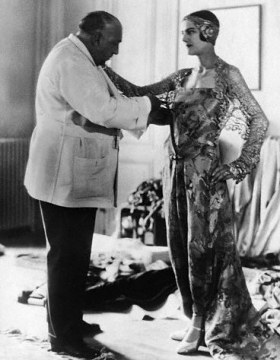Definer of good taste
Jeanne Lanvin
born 1867, Brittany, France.
Importance: on of the leasing couturies to show her work at the exhibition of modern industrial and decorative arts, in Paris, 1925.
Dies: 1946, Paris, France.
Jeanne Lanvin started her own millinery business in 1890, interducing women's clothing in 1909, followed by menwear in 1926. After the birth of her daughter, Marie Balenche, she was inspired to custom-make childern's clothing. Which meant the house of Lanvin was the only couturier design for the entire family.
Inspired by her extensive art collection(including works by Edouarad Vuillard, Auguste Renoir, and Oldilon Redon) and personal costume archive (consisting of garments for 1848 to 1925), her designs reflected intensely personal. feminine preferences.


---------------
The Pauvrete-de-Lux Look
Gabrielle (Coco ) Chanel
Born 1883, Saumur, France.
Importance: Democratized Fashion by bringing comfort and practical to the haute couture dress.
Dies: 1971, Paris, France.
One of the most famous designers of all times, Gabrielle Chanel adopted a philosophy toward pret-a-porter that undermined the need for the need of the exclusivity and uniqueness in fashion. Taking inspiration from men's clothing particular military and working-class attire. Chanel created simple, practical cloths for new generation of women who were active, held jobs, and sought comfotrable clothes.

------------------
The Surrealist "Artist"
Elsa Schiaparelli
Born 1890, Rome, Italy.
Importance: Combined fashion with surrealist art.
Died: 1973, Paris, France.
Elsa Schiaparelli allied fashion with art and popular culture, interoducing a levity not seen before in high fashion. In doing so, she did more than other designer to break down the "exclusivity"of haute couture fashion. She collaborate widely with artist, producing textiles and garments with surrealist artist Salvador Dali, among other, Renowned or her unusual and novel bottons, hats, and embroidery. Schiaparelli was the first couturier to use zip fasteners on the pockets of a beach jacket, in 1930, and in skirt in 1934.
"Women dress alike all over the world: they dress to be annoying to other women."











































